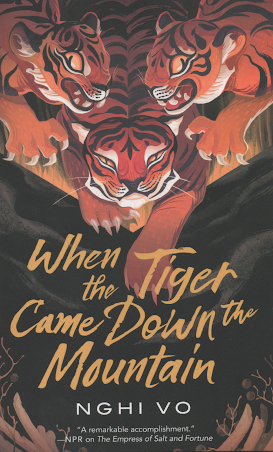First impression review: When the Tiger Came Down the Mountain, by Nghi Vo
This little novella feels like a folktale or a fairytale retelling but is (so far as I know) a totally new creation. As in something like ‘1001 Nights’ we have a frame story and a tale, or rather two versions of a tale. Chih, a nonbinary cleric from the Singing Hills monastery, is traveling north with mammoth-rider Si-yu on a mission to collect stories. But as they approach the way station they have to take shelter in a barn after being threatened by a trio of tigers. Chih is level-headed enough to speak to them respectfully when they realize that the tigers can talk and take on the forms of women:
“Why are we talking to tigers?” asked Si-yu. “Because they are talking to us.” Chih said, stifling a somewhat hysterical giggle. “They can talk, and now they’ve seen that we can. That’s – that means that they’ll treat us like people.” “But there’s still a chance that they’re going to eat us.” “Oh yes. Some people are just more…edible than others if you are a tiger.”
The tiger queen Sinh Loan is intrigued that Chih knows a tale of the tiger Ho Thi Thao and her marriage to the human lady scholar Dieu. Chih says they’d love to hear the tiger version, but Sinh Loan replies:
“No, I think you are going to tell us what you know instead,”… “We’ll tell you when you get it wrong,” growled Sinh Hoa abruptly… “Best not get it wrong too often,” advised Sinh Cam.
So Chih tells the tale – with the tigers interjecting – hoping the other mammoth riders will show up before the tale is done!
The tiger version of the story is, unsurprisingly, rather bloodier than the human version, and does not involve the tiger ever being in a weak position. But it also involves Ho Thi Thao and Dieu’s courtship progressing faster, with them being technically married by the halfway point instead of just at the end, for instance. There is no “true” version of the story, of course – not that anyone but the characters involved would know, anyway. The point is that the humans and tigers, because of their cultural differences, focus on, remember, or add different details:
“Dieu swallowed hard, and then something came to her… ‘From the deepest part of the Yellow Springs, my dear husband, I call to you…’ ‘I’m right here,’ said the second Cheng son in surprise, and the tiger growled. ‘No one was talking to you,’ she said. ‘My eyes are open for always, my mouth is empty for always, and always will my soul reach for yours…’ ‘Let me stay and be for you,’ said the tiger, and she rose and drove away the ghosts…” “Oh!” said Sinh Cam, her eyes wide. “Oh, I like that!”…but Sinh Loan was shaking her head. “Abysmal, cleric, completely abysmal. That’s not what happened at all.” “No, but I like it more,” Sinh Cam said enthusiastically…She yowled in offense when Sinh Loan reached out to cuff her ear. “You’re not supposed to like that,” she scolded. “It’s wrong.” Sinh Cam licked her paw and groomed her affronted ear vigorously. “I can like it if I want,” she said sullenly. “You can, but quietly, or the cleric will think it is all right to keep telling it that way.”
There are lots of intriguing little details provided that make the world seem bigger than you’d expect for a story told in 122 pages. For instance, Chih normally works with a “recorder bird” named Almost Brilliant, who seems to be human-level intelligent. But she’s on maternity leave (not that it’s called that!) while incubating her eggs. Besides the cool detail of mammoths still existing, we also learn that mammoth riders (and 2 generations of their descendants) are prohibited from taking a place in the imperial bureaucracy because their beasts give them too much power to throw a coup. And there are ghosts and fox spirits…etc. This is, in fact, a sequel to ‘The Empress of Salt and Fortune’ – though it works perfectly well as a standalone – and more tales in this alternate-earth universe are in the works!
Overall recommendation: I wouldn’t say the debated tale is a good love story in the modern sense – too much dubious consent, given the power imbalance and demonstrably bitey tendencies of tigers. But if you like classic fairytales (and perhaps wish for something in that style where the LGBT stuff is less subtextual) or like stories about stories, you will probably enjoy this.



